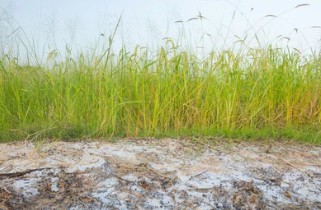
Soil salinity is one of the major abiotic stressors limiting plant growth and crop productivity. Salt directly affects the physiological and biochemical activities of forage and turf plants, slowing down growth and developmental processes. Salinity effects in soils are manifested by reduced water effectiveness (high osmotic potential due to excessive salinity), structural deterioration (sodium-induced back-flocculation of soil-like bodies), toxic ions (Na, Cl), and salt/mineral nutrient imbalance. Salt tolerance in forage grasses is a complex trait involving root morphology/kinetics, uptake and translocation of toxin Na/Cl, and physiological, metabolic regulatory processes at the cellular level to enhance genes. Progress in improving salt tolerance through conventional breeding has been slow. Recent advances in biotechnology have led to the development of more effective selection tools to replace phenotype-based selection systems.
Our scientists seek to identify various adaptive responses to salinity stress in forage grasses at the molecular, cellular, metabolic, and physiological levels, including but not limited to:
(i) Water stress caused by the negative water potential of the rooting medium.
(ii) Unfavorable specific ionic effects (toxicity) where the intake of excess sodium or chloride disrupts membrane integrity and function.
(iii) Nutrient ion imbalance, where excess sodium or chloride leads to reduced potassium, nitrate or phosphate uptake.
We integrate information on salinity tolerance-related signaling, molecular tools, and histological techniques to develop effective methods/strategies to minimize the deleterious effects of high salinity on forage grasses. Lifeasibe offers customized solutions for the molecular breeding of salt-tolerant forage grasses, genetically modifying domesticated crops through breeding and selection to produce forage grass varieties with enhanced salt tolerance. Our genetic engineering strategies include the following:
(1) Effective screening techniques for selecting and evaluating specific traits.
(2) Identification of genetic variation.
(3) Knowledge of the inheritance of tolerance traits at specific developmental stages.
(4) Knowledge of the biological mechanisms behind tolerance.
(5) Reliable direct or indirect selection criteria.
(6) Design the most appropriate breeding method/strategy to transfer the tolerance trait to an improved genetic background.
Our sequencing and bioinformatics methodologies can predict genomic selection. Our advanced genetic technologies allow targeting changes to specific loci through "gene editing" techniques. Lifeasibe enables forage grasses to grow more efficiently under high salinity stress than conventional varieties by breeding for salt-tolerant genotypes. Please contact us for more detailed information.
Reference
Lifeasible has established a one-stop service platform for plants. In addition to obtaining customized solutions for plant genetic engineering, customers can also conduct follow-up analysis and research on plants through our analysis platform. The analytical services we provide include but are not limited to the following:
Get Latest Lifeasible News and Updates Directly to Your Inbox
Adaptive Evolutionary Mechanism of Plants
February 28, 2025
Unraveling Cotton Development: Insights from Multi-Omics Studies
February 27, 2025